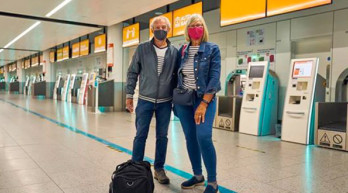
The coronavirus pandemic poses a clear and very present danger, so it’s natural that the brands helping to counter the impact of Covid-19 are choosing practical ways to provide an immediate benefit. Hand hygiene continues to be a focus for reducing transmission of the virus. The expertise of spirits, fragrance and cosmetics companies leaves them well placed to produce hand sanitiser, which is why Italian liqueur-maker Illva Saronno is filling 100,000 small bottles normally used for miniatures of its Disaronno brand with antibacterial gel. These pocket-sized disinfectant packs are being distributed to charities working with disadvantaged people throughout Italy.
Another familiar Italian name, Bulgari, is having several hundred thousand recyclable plastic bottles of hand-sanitiser gel produced to give to the country’s Civil Protection body. This initiative follows Bulgari’s recent donation of a new state-of-the-art 3D microscope to a hospital in Rome for use in Covid-19 research.
Outside Italy, Scotch-whisky distiller Loch Lomond Group, which operates one of Scotland’s largest distilleries, has donated bottles of hand sanitiser to healthcare organisations and frontline service-providers helping the vulnerable across Scotland.
Our second batch of hand sanitiser is now available for immediate donation for anyone in need at the moment - key workers, frontline services, charities, individuals or organisations. https://t.co/sooFmwpvcE#InThisTogether pic.twitter.com/G46tcjzC6d
— Loch Lomond Group (@LochLomondGroup) April 21, 2020
US drinks group Brown-Forman is using bottling plants in Kentucky, Mexico and Canada to make hand sanitiser, but the Jack Daniels owner is also making a $1 million donation to Covid-19 response funds in America. Among the beneficiaries are organisations supporting bar and restaurant workers who have lost their jobs because of the pandemic.
Skincare specialist Spongelle Beyond Cleansing, also based in the United States, is donating 5% of its online sales to the country’s Centers for Disease Control. The company has developed an antibacterial sponge, and research suggests that sponges are more effective than hand-washing in tackling infection.



